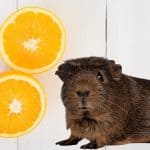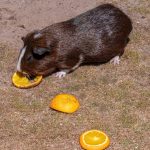Can guinea pigs eat oranges?
You know that your piggy’s daily diet must include plenty of hay, clean water, pellets, and a serving of 5-6 fruits and vegetables.
The question is, can oranges be among those fruits?
Keep reading to find out!
CHECK OUT: Safe Guinea Pig Food Chart
Table of Contents
Can Guinea Pigs Eat Oranges?
Short answer, yes, absolutely. Not only can guinea pigs eat oranges, but the citrus fruit is actually a highly recommended part of their diet!
See, guinea pigs cannot produce Vitamin C naturally in their bodies.
So, they need an external source, and that’s where oranges can come in handy.

Oranges are not only good in taste but also refreshing for your guinea pigs. They are low in calories and are extremely low in fat content. They have a considerable amount of Potassium as well.
All these factors have a positive impact on their general as well as cardiovascular health. Additionally, it contains a lot of fiber as well which maintains its gastrointestinal health.
Here is a video describing the benefits your little piggie can obtain from eating oranges!
Oranges Health Benefits & Nutritional Content
Let’s take a look at the basic nutritional content of oranges. Then we’ll talk about how this sweet citrus fruit benefits your cavy.
Nutritional Content
There are around 62 calories in one orange. 2% come from fats, 91% from carbohydrates, and 7% from proteins.
| Nutrients | Amount | Percentage |
| Folate | 30 ug | 7.5% |
| Niacin | 0.282 mg | 2% |
| Pantothenic acid | 0.250 mg | 5% |
| Pyridoxine | 0.060 mg | 4.5% |
| Riboflavin | 0.040 mg | 3% |
| Thiamine | 0.100 mg | 8% |
| Vitamin C | 53.2 mg | 90% |
| Vitamin A | 2250 IU | 7.5% |
| Vitamin E | 0.18 mg | 1% |
| Vitamin K | 0 ug | 0% |
| Sodium | 0 mg | 0% |
| Potassium | 169 mg | 3.5% |
| Calcium | 40 mg | 4% |
| Copper | 39 ug | 4% |
| Iron | 0.10 mg | 1% |
| Magnesium | 10 mg | 2.5% |
| Manganese | 0.024 mg | 1% |
| Zinc | 0.08 mg | 1% |
Health Benefits for Guinea Pigs
The vitamin C content is the main reason for feeding oranges to your guinea pig, so we’ll focus on the health benefits of that vital nutrient.
Vitamin C has multiple key roles in the body.
- It helps in the absorption of Iron from the gut, preventing Iron deficiency anemia
- It increases immunity (Our natural ability to fight germs)
- It has a protective action on cells from oxidative damage.
- It stimulates the production of Collagen, which is a kind of protein that facilitates wound healing and also leads to firm and younger-looking skin.
- It reduces the free radicals in our body which could lead to cancer.
- It slows down the process of macular degeneration which is a common cause of vision loss in old age.
- It has a role in lowering the levels of Cortisol (Stress hormone) in the body.
Oranges also have the following nutrients that make them a highly beneficial dietary item. Let’s take a look and see how these other nutrients benefit our piggies.
Fiber
Guinea pigs need a high-fiber diet to maintain optimal health, and oranges are a good source of it. That said, the bulk of your cavy’s fiber should come from hay and pellets.
Think of the fiber in oranges as an extra perk rather than the main reason for feeding them to your piggy.
Calcium
Oranges have a high calcium content, which keeps your cavy’s bones and teeth strong.
Folate
100 grams of orange has 30 ug Folate, which is especially important for young guinea pigs. It plays a significant role in healthy bone and bone marrow development.
Vitamin A
Just like in humans, Vitamin A helps keep your cavy’s eyes in great shape. It also plays a role in maintaining healthy skin.
READ MORE: Can Guinea Pigs Have Apples?
How to Safely Feed Oranges to Your Guinea Pig
Although oranges please your pet’s taste buds and have a pretty impressive benefit profile, feeding them too much or too often can lead to health risks in guinea pigs. Remember, their immunity and the tolerance of their gut is much less than ours.
Let’s look at how to safely give them to your cavy.
How Much & How Often Can Guinea Pigs Eat Oranges?
It is safe to treat them to this refreshing fruit twice a week with adequate spacing, but do not serve them the whole orange!
One or two small slices are quite enough to provide them with nutrients without causing any hazards.

READ MORE: Can Guinea Pigs Eat Strawberry?
Risks Associated with Excessive Orange Consumption
If fed in excess, certain risks have been observed to be associated with them. These must be kept in mind to ensure the safety of your guinea pigs.
- Orange contains a high calcium content, which is required only during the growing stage when bone development is occurring.
- Excess calcium can cause kidney and bladder stones, leading to Urinary tract infections which present with painful micturition.
- Diarrhea can occur, which might result in dehydration and electrolyte imbalance.
- It is very high in sugar and poses the risk of development of Diabetes.
- Citric acid gives it an acidic nature which can affect the acid-base balance of the pet’s blood, corrode the lining of the gastric wall, and damage the enamel of the teeth if served in excess or in an unripe form.
Caution to Take While Feeding Oranges to Guinea Pigs
- Introduce the fruit very gradually into the pet’s diet. Initially, offer a very small quantity and wait for a day or two while keeping a close eye on it for any side effects.
- If your pet does well, you can slowly build up the quantity of the fruit without exceeding the amount recommended above.
- If the fruit is not organic and is purchased from the market, be very vigilant while washing the fruit prior to serving them to the piggie to remove any pesticides that might be present on it.
- It is recommended to peel off the skin as it might contain a small amount of residual pesticides.
- Remove all seeds of the fruit before feeding it as the pet might choke on them.
- Make that the fruit is ripe, as the pH of an unripe orange is acidic.
Check out this cute video of a cavy eating orange:
READ MORE:
- Can Guinea Pigs Eat Grapefruit?
- Can Guinea Pigs Eat Peaches?
- Can Guinea Pig Eat Kiwi?
- Can Guinea Pigs Drink Tap Water?
- Can Guinea Pigs Have Pears?
FAQs
Are oranges safe for guinea pigs?

Yes, they are safe if given in a restricted quantity which is about one to two slices of a medium-sized orange twice a week. If they are given in excess, several health risks can occur like diarrhea, UTIs, Kidney and Bladder stones, and Diabetes.
Why do Guinea pigs need an external source of Vitamin C?
Like humans, guinea pigs are unable to produce ascorbic acid in their bodies and hence it has to be supplemented through diet or feed pellets. It has multiple key roles in the body and its deficiency can cause a disease called Scurvy.
Do oranges fulfill the nutrient requirement of Guinea pigs?
Oranges are a good supplement to enhance the nutrient content in the pet’s diet and to be offered as an occasional delicacy but oranges alone are not enough to meet its dietary requirements. To fulfill its dietary needs, hay, 5-6 servings of fruits and veggies, and feed pellets must be given.
What happens if a guinea pig consumes one whole orange?

Oranges are quite safe for guinea pigs if given in recommended amount, but it is likely that they will develop bloating, flatulence, and an upset stomach if one whole orange is consumed. It is not something to be worried about unless diarrhea is severe. However, if it happens on a regular basis, the rodent might develop obesity, diabetes, and urinary tract infections.
Is it necessary to remove seeds of the orange before serving it to the guinea pig?
Yes, it is extremely important to do carefully remove all the seeds as the pet can choke on the orange seeds and it can even prove to be fatal due to respiratory obstruction.
Should I remove the orange peel before feeding it to my guinea pigs?

It is advised to peel the skin due to the risk of pesticides that might be present in it but it is not an absolute necessity. It is safe, edible, and contains Vitamin C, but do not feed it in excess.
Why is it often advised to wash the orange before consuming it?
Oranges purchased from the market have wax and pesticides on their surface which can cause health risks to humans as well as pets, that is why it is advised to wash them thoroughly before consuming or serving.
I fed my guinea pig oranges in excess and it has developed diarrhea. What should I do?
Feed him plain yogurt with active cultures, give him probiotic supplements, and until the veggies and fruits in diet until the loose stools settle. Make sure he drinks an ample amount of water to make up for his lost fluids. If his condition is severe, take him to the vet immediately.
Can a guinea pig eat a canned orange?

No, guinea pigs cannot consume canned oranges as they are very high in sugar content and also contain preservatives, which makes them unsafe for the pet.
Can guinea pigs drink orange juice?

Yes, they can if the juice is squeezed from fresh oranges and is diluted with water to reduce the concentration of sugar and calcium. It is advised to offer only a small amount of it to the guinea pig.
Conclusion
Oranges are safe for guinea pigs and are in fact, beneficial for them as they are loaded with Vitamin C.
The fruit also has a considerable quantity of potassium, calcium, fiber, and Vitamin A, and trace amounts of other Vitamins and minerals as well.
Plus, it’s refreshing and hydrating to your cavy!
However, it must be fed not more than twice a week, and that too in a restricted amount to avoid the risks associated with its excess, which includes GI upset, Urinary tract problems, and hyperglycemia.
References
- “Guinea Pig Feeding.” 2021. The Humane Society of the United States. 2021. https://www.humanesociety.org/resources/guinea-pig-feeding.
- “Guinea Pigs – Nutritional Requirements.” 2020. Pfma.org.uk. 2020. https://www.pfma.org.uk/guinea-pigs-nutritional-requirements.
- Turner, Tami, and Betty Burri. 2013. “Potential Nutritional Benefits of Current Citrus Consumption.” Agriculture 3 (1): 170–87. https://doi.org/10.3390/agriculture3010170.

Can guinea pigs eat oranges? Have you tried feeding your cavies oranges? Please share your experience below!
Alina Hartley is a small-town girl with a ginormous love of bearded dragons. It all started with Winchester, a baby bearded who was abandoned at the shelter by his former owners because of a birth defect that caused one front leg to be shorter than the other. Alina originally went to the shelter looking for a guinea pig, but one look at Winchester and it was love at first sight. From that day on, Alina has dedicated her life to learning everything she can about bearded dragons. She loves helping new beardie parents start their incredible journey with these magnificent reptiles.
Follow her on:
LINKEDIN
TWITTER.
Read her latest articles HERE
Learn more about her HERE.


